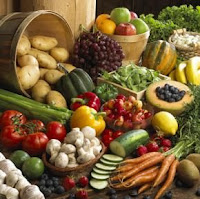There are a few more things about osteoporosis that I want to get out there. But I came across this article on ccn.com today and thought I'd pass it along. This is actually a very sensible article on gluten. It differentiates between celiac disease and the increasingly popular "gluten sensitivity." Give it a read.
Wednesday, April 13, 2011
Thursday, April 7, 2011
Osteoporosis 8- Fruits and Vegetables
 Most people are aware that calcium is a crucial part of bones. More recently, there has been much discussion on the benefits of vitamin D. From a purely reductionist standpoint, we could go on all day about the significance of magnesium, protein, phosphorus, boron, vitamin C, potassium and other nutrients that are vital to bone health. This is a great review article that describes the benefits of several of these key nutrients. But the authors sum it up succinctly by concluding:
Most people are aware that calcium is a crucial part of bones. More recently, there has been much discussion on the benefits of vitamin D. From a purely reductionist standpoint, we could go on all day about the significance of magnesium, protein, phosphorus, boron, vitamin C, potassium and other nutrients that are vital to bone health. This is a great review article that describes the benefits of several of these key nutrients. But the authors sum it up succinctly by concluding:"Bone health rests on a combination of several factors including on an adequate dietary pattern....
Optimal protection of bone requires a diet rich in dairy products (mainly fat free), fruit and vegetables and adequate amounts of meat, fish and poultry." Arq Bras Endcrinol Metabol 2010 Mar;54(2):179-85
In other words, a well-balanced diet is necessary for optimal bone health. Some of you may disagree on exactly what a "well-balanced diet" looks like. Should you include dairy as these authors suggest? Is the inclusion of meat, fish and poultry absolutely necessary? While there may be some disagreement on the details, all authorities agree on the benefits of fruits and vegetables. In fact, one study concluded that plant based calcium sources and that dairy intake was not essential.
"Osteoporosis, which has become a serious public health concern, is influenced by diet, especially calcium intake. Dairy products are a good source of calcium, but plant calcium may also be important in populations that do not consume a large amount of milk....Our results suggest that high dietary intake of calcium, especially plant calcium, reduces the risk of osteoporosis and increased bone mineral density in postmenopausal Korean women. Vegetables may be an important source of calcium and may also provide vitamins and minerals that exert additional beneficial effects on the bone." Nutr Res 2011 Jan;31(1):27-32
Vegetables. You really can't have strong bones without them.
Sunday, April 3, 2011
Osteoporosis 7- Oxidative Stress
 You may have heard the term "free radicals." If not, then you've probably heard the term "antioxidants." We talk about antioxidants in fresh fruits and vegetables. Beauty creams often boast of their antioxidant content and makers of nutritional supplements often tout the antioxidants in their products.
You may have heard the term "free radicals." If not, then you've probably heard the term "antioxidants." We talk about antioxidants in fresh fruits and vegetables. Beauty creams often boast of their antioxidant content and makers of nutritional supplements often tout the antioxidants in their products. Science has long known that free radicals, when left to their own devices, often wreak havoc on body systems. For example, you may have heard of LDL as the "bad cholesterol." Well, oxidized LDL is generally regarded as far more toxic in its ability to damage blood vessel walls. The point is, oxidative stress (in the absence of plenty of antioxidants) is a bad thing.
Is there any role in osteoporosis? Not surprisingly, oxidative stress can be very damaging to bones. In this particular study, scientists found that oxidized LDL (yes- the same thing that vigorously promotes hear disease) is involved in shutting down activity of bone-producing cells. Realizing that bone producing cells (osteoblasts) are always in a precise dance with bone degrading cells (osteoclasts), oxidized LDL will effectively disrupt that carefully orchestrated dance.
Another study of healthy post-menopausal women also showed that oxidative stress increased bone resorption (breakdown of bone).
Does a diet rich in antioxidants (fruits and vegetables) help osteoporosis? Absolutely. We'll examine this further in the next post.
Labels:
osteoporosis,
oxidative stress
Subscribe to:
Posts (Atom)